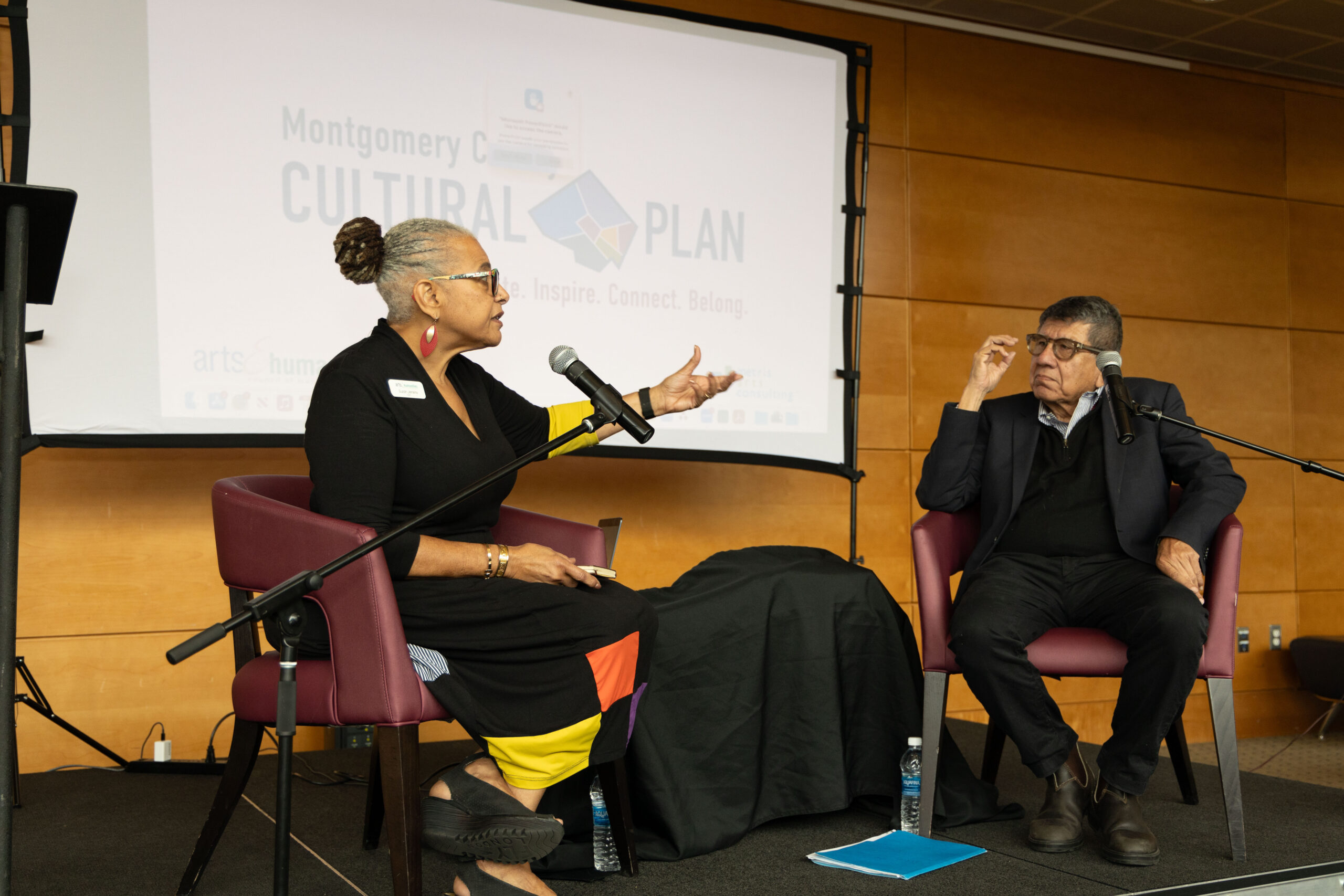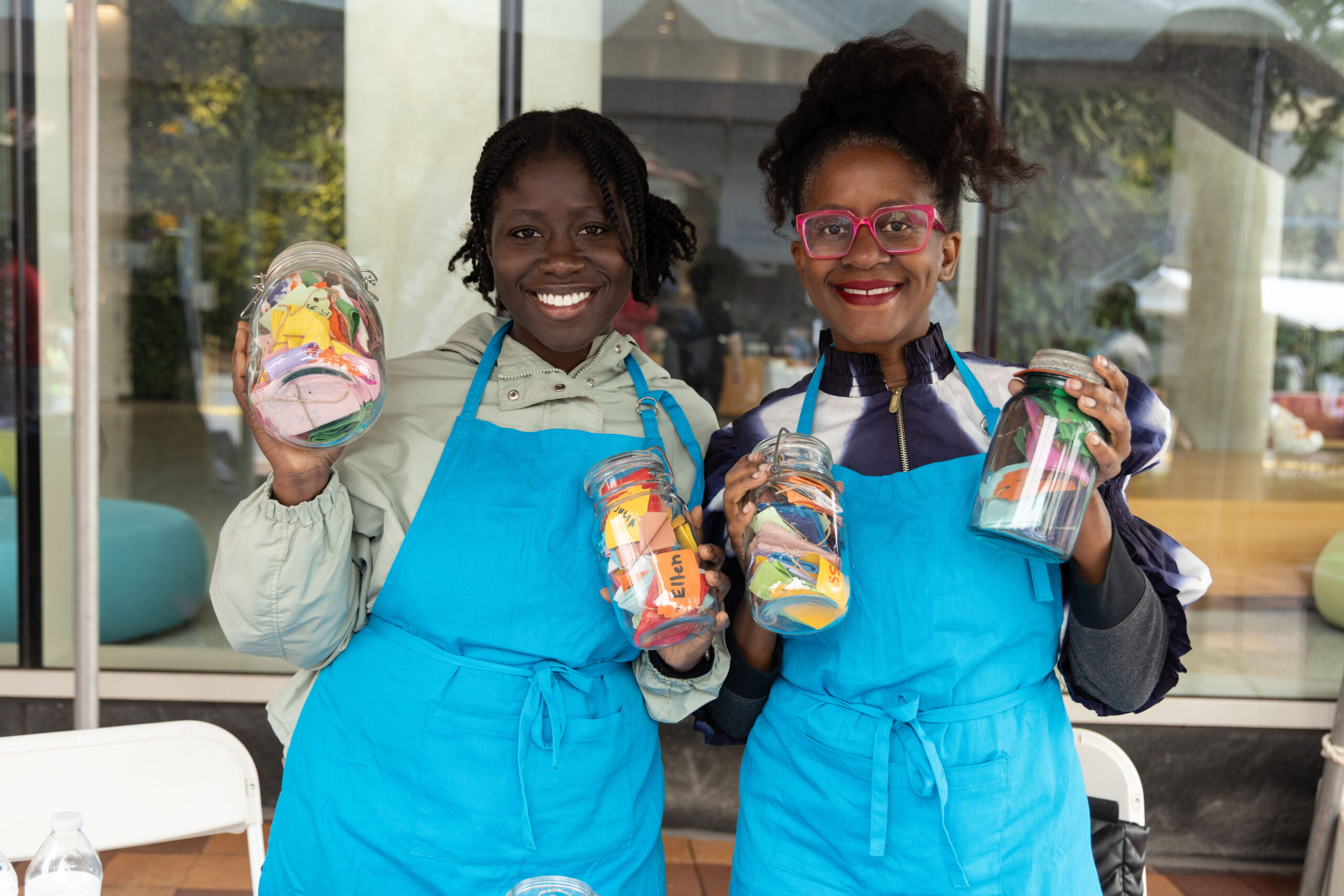Select Language __________ 🇪🇹🇰🇷🇪🇸🇫🇷🇨🇳🇻🇳🇺🇸
Cultural Plan
EVENTS AND OPPORTUNITIES TO PARTICIPATE
On Wednesday, October 16, 2024, AHCMC gathered with 125 grantees, partners, and supporters at the Strathmore Music Hall to kick off the cultural planning process. We introduced our cultural planning consultant team, Metris Arts Consulting, and talked about our goals for the new plan. The event featured a keynote speech from Roberto Bedoya, the Cultural Affairs Manager for the City of Oakland. Bedoya told the audience about his work guiding the creation of Oakland’s cultural plan, “Belonging in Oakland: A Cultural Development Plan.” He said equity is the plan’s driving force, culture is its frame, and belonging is its goal. At the conclusion of the gathering, participants wrote their wishes for the new plan on colorful paper airplanes and sent them soaring. Their wishes echoed the values of diversity and belonging, including “Making the unfamiliar familiar, connecting communities of very different backgrounds and inspiring exploration,” and “For all of us to belong, survive, soar!”
| Photo Gallery | Slide Deck | |
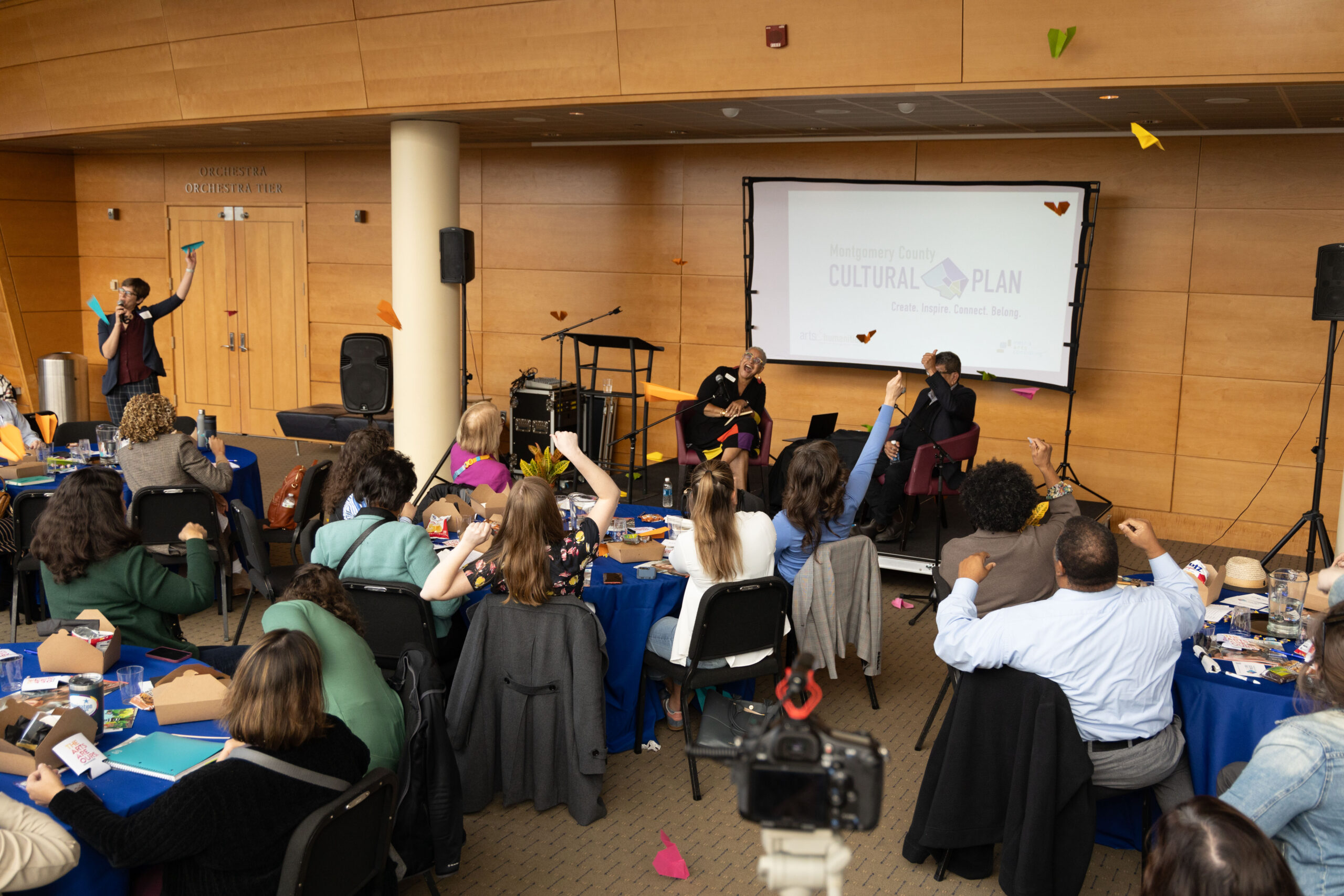 |
 |
In partnership with Councilmember Natali Fani-González’s office, we held a youth town hall in Wheaton on March 31, 2025 to gain insights into our younger residents’ specific interests, needs, and ideas. Open to students in middle and high school, the town hall introduced students to cultural planning and asked for their input on pressing issues facing their communities and how art, culture, and creative expression might help us address them. The agenda featured dynamic and creative activities, guided group discussions, and recording by a graphic notetaker and local youth documentarians. The event was held on a day Montgomery County schools was closed; students received community service hours for attending.
| Photo Gallery | Slide Deck | |
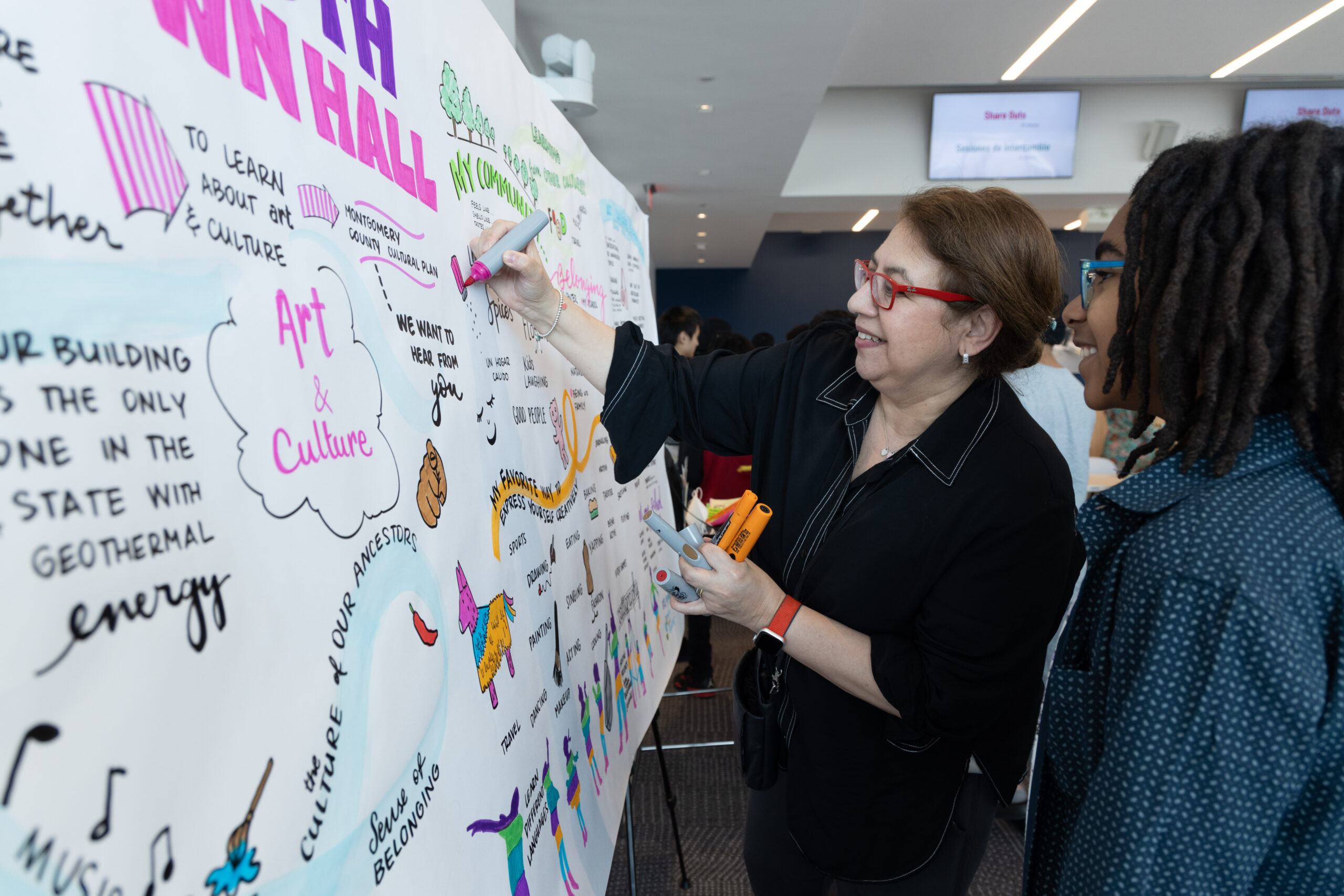 |
 |
| Highlights Video | Event Summary | |
 |
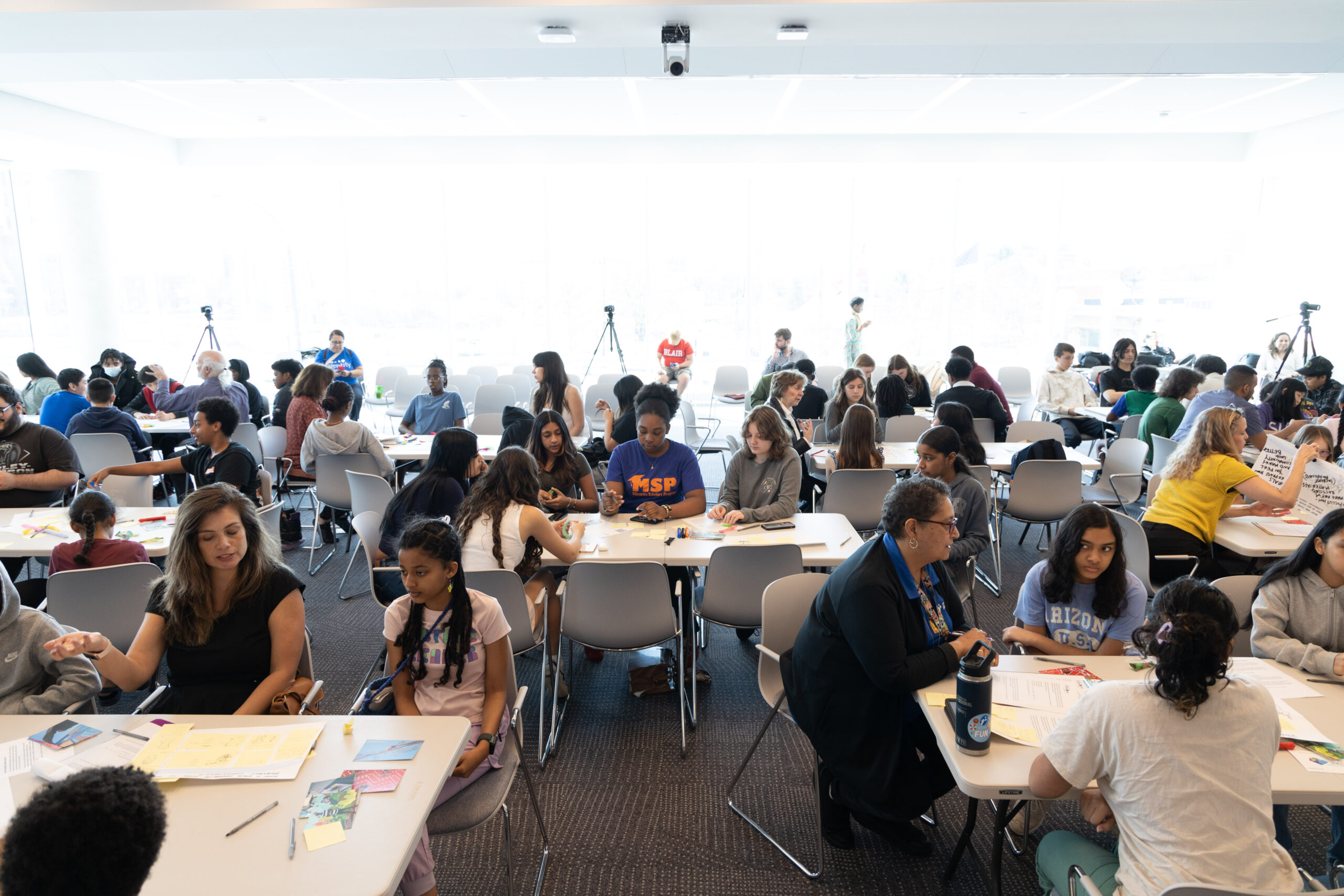 |
We will reach residents across the county through artistic pop-up events called Cultural Preserves. Local artist Holly Bass designed this creative community engagement project, in which people on the street are invited to contribute responses to thoughtful questions and document them on rice paper “preserved” in mason jars and through photography. People’s responses to questions like “What makes this community home for you?” will provide a fresh perspective on themes we will explore throughout the planning process, such as “belonging.” We will hold a Cultural Preserves event in each of the seven County Council districts, popping up at existing gathering places like farmers’ markets, cultural and religious festivals, and food distribution centers.
Find Cultural Preserves at:
Confirmed –
- MoComCon 2025, Germantown (location), March 22, 2025
- VisArts Rockville Arts Festival, Rockville (location), May 4, 2025, 10am-12pm
- Taste of Wheaton, Wheaton (location), June 1, 2025
- Strawberry Festival, Sandy Spring (location), June 7, 11am-1pm
- Scotland Juneteenth Heritage Festival, Potomac (location) June 19, 2025, 9am-1pm
- SummerFest, Gaithersburg (location), June 28, 2025, 6:30-8:30pm
To gather input from as many Montgomery County residents as possible, we developed a survey that was available to the public from this web page. The survey questions were designed to capture diverse perspectives from residents across the county. Therefore the survey was available in languages commonly spoken in the county, including English, Spanish, Amharic, Chinese, French, Korean, and Vietnamese. The survey asked about residents’ priorities for arts, culture, and heritage in Montgomery County. It also included questions for individual artists, creative sector businesses, and arts, culture, and humanities organizations. Update: The Community Survey closed in early August with over 1,000 Montgomery County residents participating. Thank you!
We want to hear from as many community members as we can about their needs and priorities for art, culture, and heritage in Montgomery County. Using a technique called “meeting-in-a-box,” we have developed a toolkit to enable interested stakeholders to lead their own community conversations. They can then share their findings with us to inform the plan. We will prepare and train hosts and set them up for successful meetings to discuss topics such as creating a community where everyone belongs and can lead culturally rich lives, helping our artists and our cultural communities thrive, and using arts, culture, and the humanities to help solve community challenges. We are specifically recruiting hosts with relationships to high priority stakeholder groups (from El Salvadorean residents to libraries!), who might be missed through traditional engagement modes. The community conversation training and toolkit is open to anyone interested in hosting a meeting.
We will spread awareness of the cultural planning process by making brief presentations to several groups throughout the county. Through these presentations, we hope to broaden the circle of participants in the planning process by making connections with the people and businesses the boards represent. In addition, we will visit several art or civics classrooms in widespread areas of the county, such as the Agricultural Reserve. In this way, we can gain input from youth who may not be able to attend the youth town hall in Wheaton. We plan to present, in-person and/or virtually to:
- Urban partnership boards
- Arts and entertainment district boards
- Montgomery County Chamber of Commerce
- Montgomery County Appropriations Committee
- Visit Montgomery/Montgomery County Economic Development Corporation
- Montgomery County Planning, Maryland-National Capital Parks and Planning Commission
- Montgomery County Public School board
To reach core cultural sector/creative economy stakeholders, we will conduct a series of in-person focus groups with creative professionals living and working in Montgomery County. We will ask them about their experiences creating, sustaining, and making a living from their work. We will also ask about how they provide access to art, culture, and the humanities for County residents as well as how their creative work intersects with the work of the County. We will hold six small group conversations, one group each for:
- Artists, creative/cultural practitioners or scholars
- Arts educators
- Small and culturally specific arts, culture, and humanities organizations
- Mid-sized arts, culture, and humanities nonprofits
- Large arts, culture, and humanities nonprofits
- Creative for-profit businesses
ABOUT THE CULTURAL PLAN
Montgomery County’s thirty-year general plan, Thrive Montgomery 2050, approved in October 2022, recommends the creation of a new cultural plan for the County. After more than 2 years of gathering information and laying the groundwork for a new plan, AHCMC selected Metris Arts Consulting in 2024 to lead the cultural planning process.
Now in the DISCOVER (community engagement and research) phase, the new cultural plan will provide a framework for the County and its departments to support arts and humanities practitioners, arts and humanities organizations, and cultural institutions across Montgomery County to help its residents lead culturally rich lives and best support community-backed priorities through arts, culture, and the humanities.
About the Consultants
Metris Arts Consulting is a research and planning consultancy whose mission is to improve and measure cultural vitality. Metris believes in the power of culture to enrich people’s lives, help communities thrive, empower communities, and cultivate belonging. Its work in the realm of creative placemaking launched the practice. In 2010, our founder co-authored the seminal report for the National Endowment for the Arts. Metris remains a leading voice exploring how arts and culture can be an essential tool for community development. It provides essential services–planning, program development, evaluation, and research for field building–for clients across the country that include government agencies, community and arts nonprofits, and philanthropic foundations.
Cultural planning is the practice of creating place-based plans that identify priorities, guide investment, and inform local policies concerning arts and culture. Cultural plans help guide how a locality (in this case, Montgomery County) should:
- Spend public and private dollars
- Develop facilities
- Establish or change regulations
- Use public spaces and government buildings
- Promote economic development and tourism
- Support educational or artistic programs
- Make other decisions that affect arts and culture in the county
In framing how the County makes decisions on such matters, cultural plans can also influence the outcomes of county funding and policy decisions. They can help promote equitable access to arts and culture programming for all residents. They can map out how arts, culture, and the humanities can intersect with the work of the government in non-traditional ways, bringing innovation and fresh perspective to the County’s efforts in housing, economic development, health, and education. Cultural plans, like Belonging in Oakland: A Cultural Development Plan can also lay the groundwork for local areas to increase cultural and racial equity and inclusion and advance anti-racist policies.
Montgomery County’s last cultural plan was created in 2002. Since that time:
- Montgomery County has grown rapidly and become much more diverse. The County’s overall population grew by about 20 percent from 2000 to 2020. Further, the County’s non-white population grew by approximately 80 percent in that same timeframe. Approximately 60 percent of the County’s population now is non-white.
- COVID-19 pandemic impacted all of us. In addition to the broader economic and social changes from the pandemic and lockdown, artists and arts and culture organizations suffered losses of income and were forced to make changes in how they carry out their projects and programs and serve their customers and communities.
- Our vision and values have evolved. Both AHCMC and the County Council have adopted pledges to increase racial equity in funding, programming, and decision making.
- The discipline of cultural planning itself has changed. Traditional cultural planning focused on serving artists and cultural institutions and capturing economic benefit from arts and culture activities. These notions are still central to the effort, but the focus of cultural planning is much broader today. Modern cultural planning considers how art and culture intersect with and can advance the other business of the county and important aspects of residents’ lives, such as housing, health and well-being, and community building.
- The County is already investing in arts and culture, including planning for the Wheaton Arts and Cultural Center. This project demonstrates an opportunity to extend investment to communities and organizations that traditionally have not received County support for arts and culture.
We recognize that arts and culture are essential elements of our expression, our health, and our sense of belonging to our communities and one another. We believe art is for everyone and culture is all around us, every day. In creating a new cultural plan for the County, we will bring together our updated knowledge, principles, and priorities in a framework that increases access to art and cultural experience and expression for all residents.
The framing question guiding the cultural planning process is:
How can Montgomery County help its residents lead culturally rich lives and best support community-backed priorities through arts, culture, and the humanities?
With leadership from AHCMC, Montgomery County has been laying the groundwork for the cultural plan for more than two years. From efforts like the Cultural Asset Mapping Project, Reflective Conversations on Arts and Culture, and Setting the Stage, Montgomery County has already made great strides in identifying community-backed values and priorities for this cultural planning effort. Building on this work, our cultural plan research and community-engagement will explore: belonging, cultural sector resilience, and intersectionality.
Belonging: Creating a community where everyone belongs and can lead culturally rich lives
Key questions: How can arts, culture, and humanities investments and policies respond to Montgomery County’s rapid and diverse population growth, expand access to arts and culture resources for all residents, and advance racial equity?
Cultural sector resilience: Helping our artists and our cultural communities thrive
Key questions: How can the County’s arts and culture investments and policies best support the arts, culture, and humanities sector to strengthen capacity, address structural gaps, and effectively respond to continued impacts of the pandemic and economic and government policies?
Intersectionality: Using arts, culture, and the humanities to help solve community challenges
Key questions: How can arts, culture, and the humanities intersect with the work of the government and local NGOs in innovative ways to add value to the County’s efforts in areas such as housing, economic development, well-being/health, education, community building, and environmental stewardship?
AHCMC engaged Metris Arts Consulting to lead the County’s cultural planning process. Metris launched its work in September 2024 and is conducting outreach to residents; art and humanities practitioners; arts, culture, and humanities organizations; county government agencies, and other important voices. Metris will conduct engagement and knowledge gathering activities throughout 2025 and draft an equitable, inclusive, and forward-looking plan shaped by the diverse community input they gather. By February 2026, we will seek adoption by County Council, Montgomery County Planning, M-NCPPC, and the AHCMC board to act in tandem with the Thrive 2050 General Plan. AHCMC staff and board, an advisory committee with representatives from a range of County departments, and a broader community advisory group will work with Metris throughout the process.
Check this website for additional information on engagement opportunities as the process continues.








